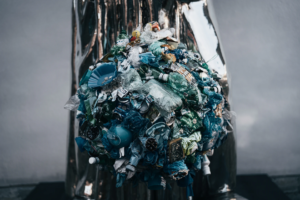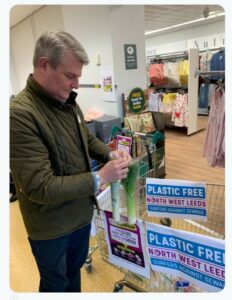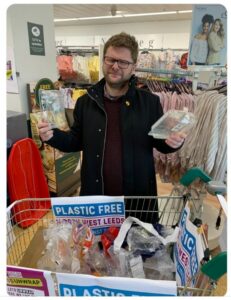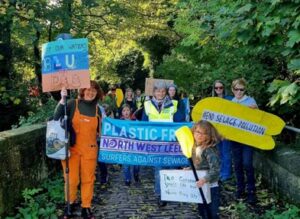What is the problem?
Plastic is popular due to its many practical uses, including packaging, clothing, and most items around your home and workplace, with 40% of all plastic produced each year being single-use [1]. It is reported that in the UK we use 38.5 million plastic bottles every day[2] – single-use items like bottles, crisp packets, and food packaging are often littered – which then gets swept into drains, ending up in our rivers and sea.
It is estimated that every year 11 million tonnes of this plastic enter the ocean each year. Ocean currents carry waste and collect it together creating huge patches of ocean smothered in our waste

One community’s example of tackling the problem: Leeds North West Plastic Free Community
Senior Environmental Consultant Evie Scott helps tackle the issues of single-use plastics in their local community through a Surfers Against Sewage Community initiative, here is her story:
How did it start?
“Back in 2019, I saw a friend set up a plastic-free shop in Ramsbottom, Greater Manchester. They really impressed me with their community initiatives which got me thinking about how I could do something similar where I lived in West Leeds.
I contacted my local councillor to express my interest in volunteering to become a community leader for the Surfers Against Sewage (SAS) Plastic Free Community, and I wanted buy-in from our local councillors and MP. It turned out I wasn’t the only one interested in this project – and I was connected to Kirsty Tucker (now the leader of Plastic Free North-West Leeds) and a small group of like-minded individuals all making a difference in the community.
Over the last few years, we have worked hard to make improvements within our community and are on set to gain our community free status soon!
What is a Plastic Free Community?
A plastic-free community is a SAS initiative to bring communities together to tackle plastic pollution in their area. However, to be a Plastic Free Community there are several pledges and commitments that we have had (and are still!) to complete:
- Steering Group: We set up the Steering Group of local stakeholders that meets twice a year to take the campaign forward. This one was more straight forward – we already had a group of interested members and our local councillors keen to support the initiative.
- Community Action and Events: We are required to host at least two community events a year; over the years we have done a number of successful events from our Mass Unwraps, various litter picks, and a protest against dumping of sewage! At these events, we often undertake brand audits of the worst culprits – these are populated by the SAS team to report on each year to identify the “Dirty Dozen”- the top 12 most polluting parent companies, with Coca-Cola and PepsiCo remaining the top two polluting brands for three years running[5]. You can read the 2022 report here: Who are the Dirty Dozen? (sas.org.uk)
Here are the team and many volunteers for one of our many litter picks near the local canal and River Aire:

- Local Governance: We needed buy in from those who make the decisions – so we spoke to our local councillors to request them to pass a resolution to support the Plastic Free Community journey. Thankfully – our councillors have been on board from Day 1 and regularly attend our events! Here is our MP, the Rt Hon Stuart Andrew, and Councillor Walshaw (chair of Leeds Climate Emergency Advisory Committee) of at our Mass Unwrap event – here we worked with our local supermarket and helped consumers unload their single-use or unnecessary plastic from their shopping to highlight the problem we face.


- Community Allies: Through identifying and working with community allies such as individuals, schools, and other organisations we can demonstrate diverse community involvement to spread the message. We engage with local schools, sports teams, churches, and institutes to raise the issue of plastic pollution and request their pledge.
SAS is not just about plastic – here is a photo from our recent protest against dumping sewage – we had a number of our community allies attending to show their support!

- Business Champions: We work with local businesses to support them in becoming plastic-free champions – by eliminating single use plastics from local businesses. From coffee shops, sweet shops, takeaways, and physiotherapists we have supported a number of different businesses to provide plastic-free choices to consumers!
How can you show your support?
- Reduce and Reuse as a priority – this is the easiest way to eliminate single-use plastics.
- Make some easy swaps– what are three items of single use plastic you are currently using -Can you eliminate these easily, or do you need an alternative?
- Join local initiatives and community litter picks!
- Ask your local councillors or MP what they are doing in the area to tackle the problem – can you support them, or put pressure on them to do more?
- Become a Community Leader yourself! It doesn’t take a huge commitment with the right people you can make a difference in your area.
Here at Temple, we strive to make a difference and protect the environment, promoting positive change for our clients and communities. As a B Corp, we seek to support wider transformative objectives, such as building our sustainability strategy around Zero Harm / Net Gain principles and recognising that businesses must do more to be forces for good. Whether that is supporting sustainability via reducing carbon footprints within the development, improving the local biodiversity, or working to understand community impact, we aim to make a difference.
Recommended Books: How to Save the World For Free a book by Natalie Fee. (bookshop.org)
[1] What is the problem with plastic? – BBC Newsround
Plastic bottles: Turning Back the Plastic Tide – Environmental Audit Committee – House of Commons (parliament.uk)
[3] How do you clean up the ocean’s biggest rubbish dump? – BBC Newsround
[4] The chemicals that linger for decades in your blood – BBC Future
[5] Who are the Dirty Dozen? (sas.org.uk)
[i] What is the problem with plastic? – BBC Newsround